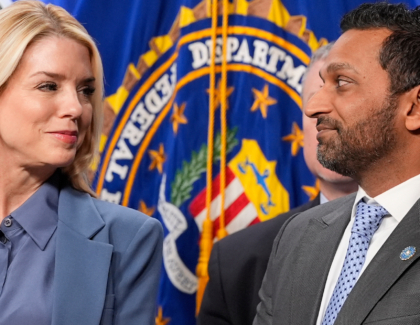Sign up for the daily CJR newsletter.
“Barack Obama,” Howie Kurtz declared, “will never get this kind of cuddly coverage again.”
With that, the uber-critic gave voice to one of the cyclical predictions of the primary season’s punditry, the prediction that appears and reappears, never fulfilled, yet never dying: that, at some point, the press will stop fawning over Obama. Kurtz made this particular prediction back in December. Of 2006.
Has it materialized? Well, flash forward to February of 2008, to Tuesday’s Potomac Primary. During MSNBC’s live coverage of the returns, as Mssrs. Matthews and Olbermann analyzed the victory speeches of the winners (Obama, by considerably more than a nose; McCain, by the skin of his teeth), Chris Matthews found yet another way to verbally cuddle the Illinois senator—and to communicate yet again his conviction that Barack, you know, rocks:
CHRIS MATTHEWS: I have to tell you, you know, it’s part of reporting this case, this election, the feeling most people get when they hear Barack Obama’s speech. My, I felt this thrill going up my leg. I mean, I don’t have that too often.
KEITH OLBERMANN: Steady.
MATTHEWS: No, seriously. It’s a dramatic event. He speaks about America in a way that has nothing to do with politics. It has to do with the feeling we have about our country. And that is an objective assessment.
“Cuddly,” meet confounding. Chris “Thrill-Up-My-Leg” Matthews may be more viscerally excited about Obama (or just, as is his wont, more vocal about that excitement) than his fellows in journalism. (As TPM’s Greg Sargent noted, “In the days before the voting yesterday an extraordinary amount of good press rained down on Barack Obama. And no network has done more to push absurdly over-the-top story-lines favorable to Obama than MSNBC has.”) But Matthews isn’t that far out of step with other journalists, whether on air or in print. It’s an open secret—and one copped to with a surprising lack of sheepishness by Obama’s legions of supporters in the political press corps—that the press and Barack are, essentially, sitting in a tree. Obama has been treated as everything from a rock star to a Phenomenon (yep, capital P) to a Men’s Vogue–certified hottie to a political Messiah (“This is the New Testament,” Matthews told The Observer last week). Last January, Slate’s Tim Noah instituted the brilliantly ironic Obama Messiah Watch, “a periodic feature considering evidence that Obama is the son of God.” And, as CJR’s Gal Beckerman noted yesterday, even the normally even-handed Donna Brazile on Tuesday night called Obama “a metaphysical force in American politics.”
The love-in is familiar at this point, so much so that we—press and public alike—seem sometimes to forget the rhetorical absurdity of suggesting that a candidate, for all that he may transcend as a politician, somehow also transcends himself (“metaphysical force”? what does that even mean?). Or to ignore the insulting implications—for candidate and supporters—of equating Obama with a cult leader. Instead, the press has often reveled in the absurdity it has created, portraying Obama as a kind of postmodern commentary incarnate (ceci n’est pas un homme politique): he’s post-partisan, post-racial, post-everything-that-we’d-want-to-change. He is so resonant with meaning, apparently, that he transcends meaning itself. “Rather than focusing on any specific issue or cause—other than an amorphous desire for change—the message is becoming dangerously self-referential,” Time’s Joe Klein put it last week. “The Obama campaign all too often is about how wonderful the Obama campaign is.”
The campaign can exploit that narrative, though, through its complementary narrative: that Obama is The Future, and not just in the sense of “change”—not just as a torch being passed to a new generation of Americans—but also in the sense that he has become a hazy repository into which we can project our hopes, realistic or not, and into which we can take a collective leap of political faith. “As Obama well knows, faith is the substance of things hoped for, and the evidence of things not yet seen,” wrote the Chicago Sun-Times columnist Cathleen Falsani. Kennedy, meet Kierkegaard.
While Obamania has been on a slow-burn build since the summer, it’s worth remembering that the press has been digging Obama’s empty-vesselism for quite some time. Sure, Hillary Clinton, carried by the narrative of Inevitability so effectively crafted by her campaign—and the DNC—had been, before Iowa, the Christened Candidate. But that’s also too narrow a view. The truth is that, while Clinton may have been cast, for the short term, as the successor to George W. Bush, the press has been framing Obama in more epic terms of inevitability: as the transformational figure who will return the party of Roosevelt and Kennedy and (Bill) Clinton to its rightful place of dominance in the twenty-first century. And it’s been doing that since 2004. Recall the pundits’ frenzied reaction to Obama’s keynote address at the Kerry/Edwards nominating convention, the time when most Americans first met the senator from Illinois. “Obama is a rock star!” declared Andrea Mitchell. “He is the best argument for the American dream that’s around in politics,” echoed Newsweek’s Howard Fineman, punditing on MSNBC. And Chris Matthews, setting himself up for his ObamaLove ’08, sealed the deal, declaring that he’d “just seen the first black president.”
CNN’s Jeff Greenfield fleshed out that idea:
Barack Obama showed why people see him as a genuine comer. Because he was reaching beyond the Democratic base to say, look, you know, there were conservative values like not wasting government money, like studying hard, like responsibility. Very Clintonian themes that can be embraced by an African-American candidate for Senate from Illinois that resonate elsewhere.
There’s truth in these four-year-old assessments, to be sure. Obama is extraordinarily charismatic, and his message of hope and change, whatever else you might want to say about it, resonates—and not just among young people—in an era of acute frustration with and mistrust of government. As John Zogby argued in the Huffington Post, “the threads of Obama’s appeal and inspiration, woven together, spring from a powerful philosophy of change that has resonated across generational lines.” Even Leon Wieseltier, by no means an Obamaniac, admits, “Obama’s popularity is owed in no small measure to the charisma of his confidence in himself. He has a redeemer’s gait, and enters a hall like he has come to save it.”
But de-facto deism comes at a cost. Idealization leads, almost inevitably, to disappointment. That rather obvious point takes an even sharper cast given that politics, and primary politics in particular, are almost wholly about Expectation: crafting it, calibrating it, managing it. Expectation is a double-edged sword, and Obama has felt both sides. He has benefited from the press’s general (though by no means total) admiration of him, and yet, in that awkward arena where the audacity of Hope meets the even greater audacity of Political Reality, Obama has fallen victim to the fact that, at the end of the day, he’s just a politician. A politician who, after he’s done thrilling the legs of his legions with the lofty lines of his rhetoric, goes back to a hotel room to pore over delegate tallies and plan how, the next day, he’ll pander to polling numbers.
His is the classic story of the ideal confronting the reality—and to the extent that he is the one as much as he is the other, Obama has been a victim of his own good press. (See “Hampshire, New,” and the melodrama with which the press treated Obama’s loss there. Indeed, you could almost see the Greek masks of tragedy hovering over the faces of TV pundits as they analyzed The Setback.) For all that his insurgent campaign has accomplished—for all that is remarkable about its achievements—it has fallen short of the expectations the press have cast for it. (See “Carolina, South,” et al, for which the general assessment of Obama’s victories has been some derivation of: “he won…but we already knew he would.”) In the calculus between Expectation and Enthusiasm, the latter can only exist when the former is, somehow, confounded. There are few things duller than met expectations.
Which brings us back to February 12, 2008. Tuesday marked a turning point: the pundits were finally willing, it seems, to legitimize Obama with that most precious of political commodities: Momentum. “You have to have a dynamic analysis,” said CNN political analyst Bill Schneider. “It can’t be static. And the reason why this works is that most Democrats like both Obama and Clinton. And if he’s starting to win, they can easily shift from one side to the other. And in this case, all the shifting is from Clinton to Obama.”
And here’s Gloria Borger, another CNN analyst:
I think, this whole question of momentum, we’ve been wondering about it during this whole campaign: when does it kick in? Well, now we’re in the home stretch, we’ve got sequential primaries and caucuses, one right after the other, and I think anyone who continues to win, for an entire month, you could say, has got to have some kind of momentum going.
You can almost hear the reluctance in her voice. For all the loose-lipping that has come to characterize punditry, Momentum is still, somehow, sacred. But Obama, it seems, finally confounded enough of the expectations imposed on him that he has won the battle for Momentum. (For now, at least.) That great instigator and indicator of victory in the race toward Inevitability seems now to be on Obama’s side. If you believe the pundits.
Has America ever needed a media defender more than now? Help us by joining CJR today.






